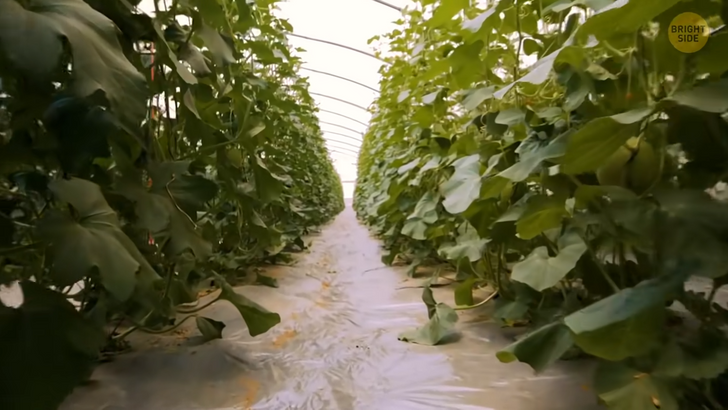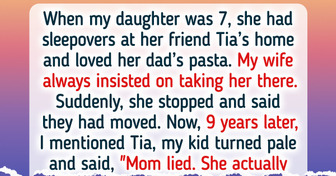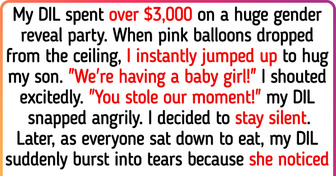13 Thanksgiving Dramas That Were Juicier Than the Turkey

Attention! Attention! Residents of all countries and cities of the world! A massive asteroid is approaching the Earth. Now its speed is several times greater than the speed of sound, and each day it accelerates even more.
Once it enters our solar system, it will fly past Uranus, Saturn, Jupiter, and Mars. The gravitational fields of these planets will also accelerate the asteroid. And our planet will be the final destination! A collision is inevitable.
According to scientists, a meteorite the size of Mount Everest can destroy the entire planet. The disaster will happen in 350 days. There’s panic in the streets. People buy and build bunkers. Scientists and astronomers from all over the world were assembled to find a solution.
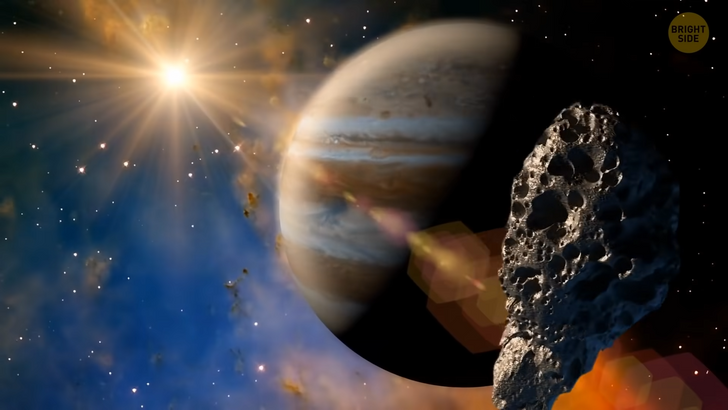
The only way to avoid the collision is to destroy the space object. Yeah, a powerful rocket can split an asteroid into hundreds of thousands of pieces. In this case, a meteor shower will hit the Earth, but it’s better than the complete destruction of our home. In less than a year, people build several powerful rockets.
Then, using the best telescopes in the world, astronomers create a unique guidance system. And now, we just have to wait for the asteroid to get into our solar system. All the people start moving to one continent with top-notch bunkers for everyone. The damage from the asteroid is impossible to predict, so it is better to hide people in one super large safe place to wait out the collision.
The moment has come. The asteroid passes by Uranus. The speed increases. Now the colossal space object moves only 10 times slower than the speed of light. Scientists launch rockets into the air. The asteroid flies past Saturn and destroys a part of its ring. The asteroid’s trajectory is changing.
It flies past other planets through a twisting path, picks up speed, and now heads towards the Earth. The rockets leave a long trail of fire behind and reach the speed of sound. They’re getting closer to the asteroid. Near Mars, a collision happens. The rockets hit the target. The asteroid explodes and splits into millions of particles. All the pieces fly in different directions. The Earth is saved.
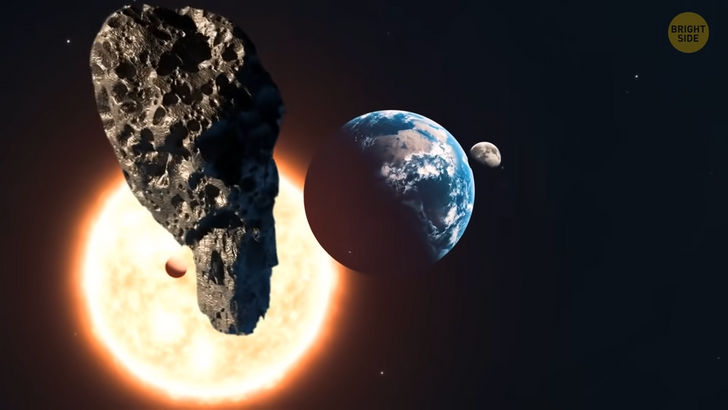
At this moment, the Earth’s satellites record a huge burst of energy. A small part of the asteroid is heading towards Earth. It’s tiny, about the size of a grain of sand. But the explosion accelerated it, and now the grain of sand is flying towards the Earth at a speed of 185,000 miles per second, which is 99% of the speed of light. [185,000 mps (~ 297,000 kps)]
At this speed, the grain has almost the same destructive power that the entire asteroid had. It’s approaching the Moon, a few more seconds, and the grain of sand will hit our planet. All the people are waiting with bated breath. The grain gets such incredible power because of the laws of physics. The greater the speed any object is, the more mass and energy it has.
When the grain of sand reaches a speed close to the speed of light, its energy and mass begin to increase dramatically. You can’t even see this tiny grain of sand, but inside, it has the mass of an entire continent. If the grain reaches the speed of light, its mass will be infinite. And then, a black hole will appear.
In this case, all living and even inanimate things on the planet will disappear. Trees, seas and oceans, all the cities, countries, and continents. Air, sound, atmosphere, any molecule of the Earth — everything will be absorbed by the incredible gravitational force of the black hole.
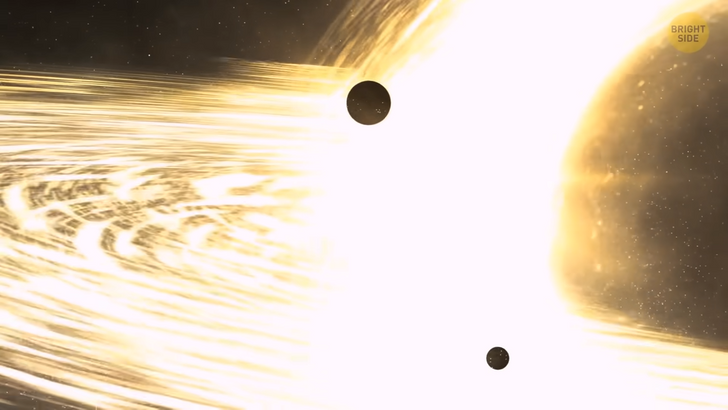
Then, when there is no trace of our planet, the hole will take over the Moon. The gravitational force will grow and absorb other planets of the solar system. Soon, it will reach the Sun. Our star will split into thousands of strips like spaghetti and will emit a tremendous amount of energy.
This could trigger the birth of a second black hole, but ... fortunately, we only have 99% of the speed of light, which changes everything. Also, no object that has mass can reach the speed of light. The grain of sand enters the Earth’s atmosphere. From the outside, it looks like a blinding meteor that pierces the sky.
The grain heats up, passing through the layers of the atmosphere. Clouds within a radius of a hundred miles around are burning up. The sky becomes crystal clear. If you look at it in slow motion, you can see the air is ionized because the air molecules are split. In nature, this process occurs during lightning flashes. Our Sun also has ionizing energy and disinfects the air.
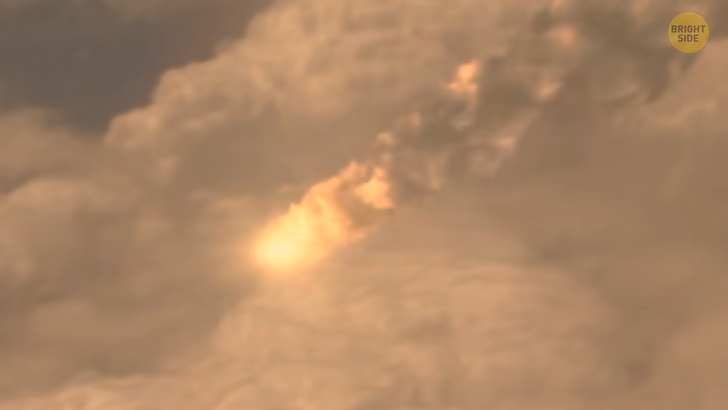
The meteorite leaves an ozone hole behind it. So now, this place is not protected from space radiation and ultraviolet light. The grain of sand flies straight into the center of the Southern Ocean. The closest continent to the explosion is Antarctica. The air around it warms up and mixes with the cold temperature of the ocean creating hurricanes.
As soon as the grain approaches the ocean surface, the water starts boiling. The temperature and energy of the grain are so huge that the water evaporates, but the vapor molecules are instantly burned up. Thousands of gallons of water just disappeared from the face of the Earth. The grain flies down for the first few feet without touching the surface as the water evaporates before it. Then it falls into the ocean and causes a powerful explosion.
Hundreds of millions of gallons of water foam and boil because of the hot temperature. The entire ocean within a radius of a hundred miles is illuminated with a bright light. The ocean depths where sunbeams have never been before are almost as transparent as the water at the bottom of a pool. The wreckage of old sunken ships splits into atoms because of the powerful explosion.
Unknown sea monsters and giant squids that live in the dark are afraid of the bright light and swim away. Then, finally, a grain of sand touches the seafloor and penetrates deep into the Earth’s crust. If it reaches the Earth’s core, the planet will most likely explode from a burst of incredible energy. Fortunately, this is not going to happen.
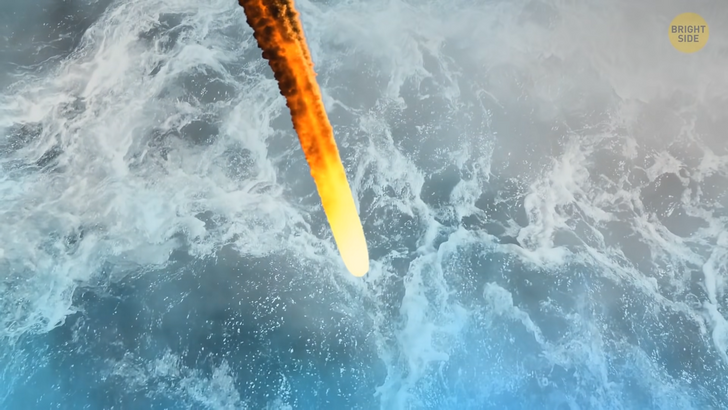
The resistance of the ocean and the ground slows down the grain and takes its energy away. It provokes a slight shift of tectonic plates. And there’s more to come. Huge waves form and spread throughout the ocean. The blast wave creates enormous tsunamis. Imagine throwing a small rock into a puddle.
The same thing happens to the ocean. Huge waves are approaching the coastal cities. Fortunately, people were evacuated from there, but the damage caused by one grain of sand will cost hundreds of trillions of dollars. Houses are destroyed, roads are flooded. After a while, it starts raining with hurricanes.
Ocean water vaporized by the grain forms into huge storm clouds. The wind drives them to the continents. And then, after the tsunami, prolonged rain begins, flooding entire countries. Several days later, natural disasters are still here.
The temperature of the Southern Ocean has increased by several degrees. The water is boiling at the collision site, melting the Antarctica glaciers. Millions of icebergs are melting away, so the water level of the world’s oceans is rising. The edges of some continents go underwater forever.
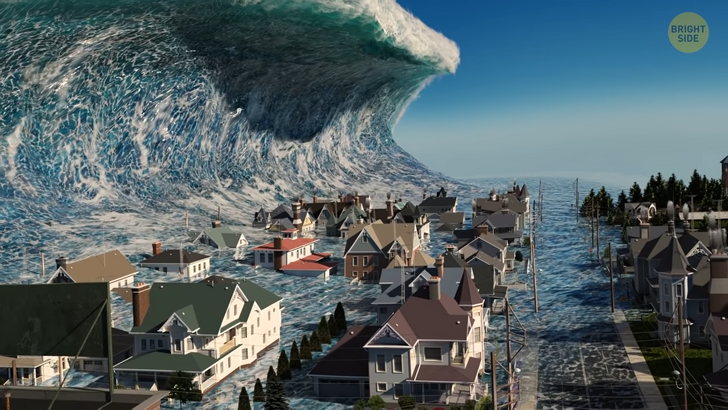
Thunderclouds reach the Sahara and other deserts. The shift of tectonic plates causes earthquakes on some continents. Volcanoes are awakening. The sky is filled with volcanic ash. It will take months for all the ashes to settle.
In the beginning, it creates challenging conditions for life on Earth. Plants and all living things don’t receive enough sunlight. In trees and seaweed, photosynthesis is disrupted. Oxygen production stops. It’s getting harder to breathe. The air that has filled the planet’s atmosphere is slowly running out.
People have to adapt to new conditions. They build new cities both on the land and in the ocean. They create plantations with artificial lighting for photosynthesis production. Fortunately, all the problems end when the ash settles. Inside the volcanoes, there’s hot magma flowing; it may come in handy as it’s rich in chemical elements and minerals.
Together with the ash, nutrients fall to the ground and the soil is now well fertilized. Plants, trees, fruits, and vegetables grow incredibly fast and produce a lot of new oxygen. The Sahara is filled with blooming flowers now, and it looks more like a meadow with flowers, not a desert. The grain of sand just renewed the planet, instead of destroying it.
